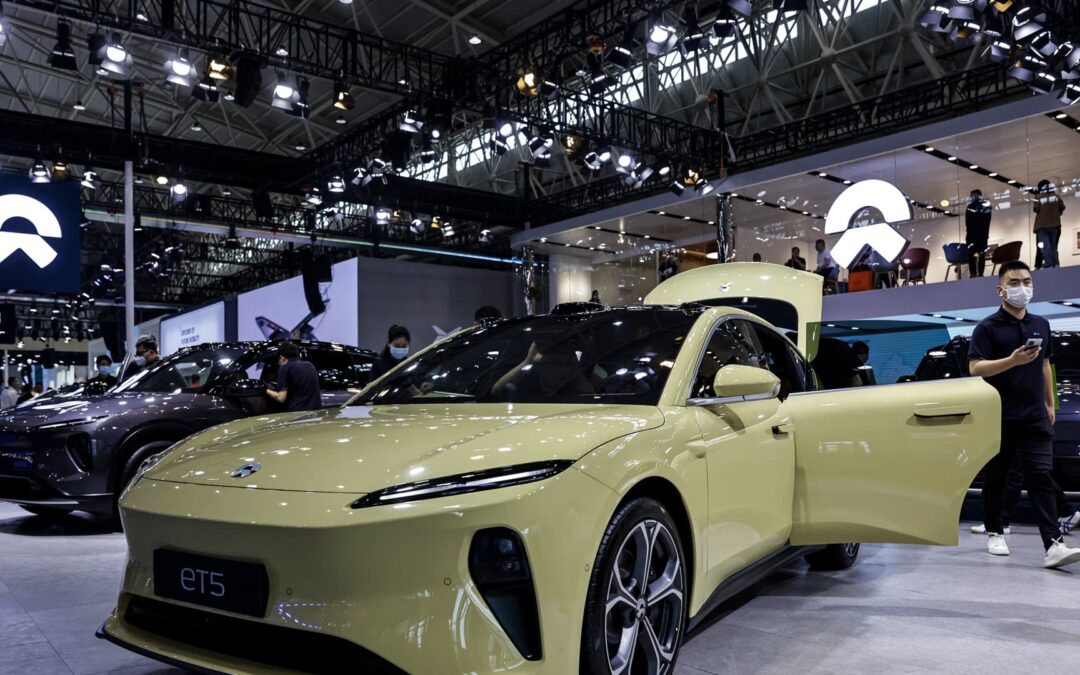Nio’s ET5 stands on display at the Central China International Auto Show on May 25, 2023, in Wuhan, China.
Getty Images | Getty Images News | Getty Images
Nio on Tuesday reported narrowing losses in the third quarter, but gave a revenue forecast below market expectations.
Here’s how Nio did in the third quarter, according to LSEG consensus estimates:
- Revenue: 19.1 billion Chinese yuan ($2.7 billion) versus 19.4 billion yuan expected.
- Loss per share: 2.67 yuan per share loss versus 2.91 yuan loss expected. That was smaller than the 3.7 yuan per share loss recorded in the second quarter of the year.
Revenue rose 47% year-on-year.
Nio shares were around 4% higher in pre-market trade in the U.S., reversing earlier losses that followed the results.
Investors are focusing on the Chinese electric carmaker’s ability to be more disciplined in its spending, as it charts a path to profitability.
Nio CEO William Li reiterated the company’s focus on being more efficient.
“We have identified opportunities to optimize our organization, reduce costs and enhance efficiency,” Li said Tuesday.
Some of those efforts are already bearing fruit. Nio reported a net loss of 4.6 billion yuan in the third quarter, down 24.8% from the second quarter of 2023, but still higher than the same period of 2022.
The company also cut 10% of its workforce last month, citing “fierce competition.”
China’s electric vehicle market is incredibly competitive, with Nio facing pressure from other startups, like Xpeng and Li Auto, as well as giants such as Tesla and BYD.
On top of that, Chinese consumers remain cautious on spending, which could weigh on Nio’s strategy to appeal to the premium segment of the local EV market.
The company said fourth-quarter revenue will be between 16.1 billion yuan and 16.7 billion yuan, representing a year-on-year increase of between 0.1% to 4.0%. Analysts expected a forecast of 22.4 billion yuan in the December quarter.
Nio also anticipates it will deliver between 47,000 and 49,000 vehicles in the fourth quarter — a hike of approximately 17.3% to 22.3% year-on-year.
Focus on efficiency
This year, China’s EV market has been the stage of a price war sparked by Tesla, which has forced carmakers to slash vehicle prices and put pressure on margins.
Nio’s gross margin was 8% in the third quarter, down from 13.3% in the same period last year.
As Nio is yet to turn a profit since it was founded in 2014, the company is trying to show investors that it can balance the need for investments, while also being more disciplined with costs.
Li said on Tuesday that Nio would defer or terminate any projects that won’t bring a financial contribution in the coming three years. He added that the company will make sure that it doesn’t “dilute” investments in core areas like technology and its sales and service network, as it prepares “for the more intense competition in the coming two years.”
As part of this push, Nio on Tuesday announced that it has entered into an agreement to acquire certain manufacturing equipment and assets from Anhui Jianghuai Automobile Group Corp. (JAC) for 3.16 billion yuan. JAC currently manufactures Nio cars.
Li said that bringing manufacturing entirely in house could reduce the costs of such operations by 10%, but that the company would exclude battery manufacturing from being drafted in-house, as the measure would not improve gross margin.
Nio CFO Steven Wei Feng said that the company’s vehicle margin, which was 11% in the third quarter, can rise to 15% in the fourth quarter, helped by lower material and component costs, as well as better manufacturing capacity.
In 2024, the company is targeting a vehicle margin of between 15% and 18%, the CFO said.







